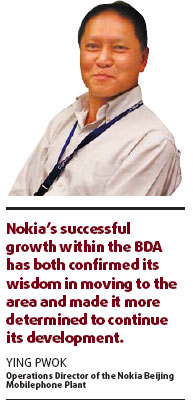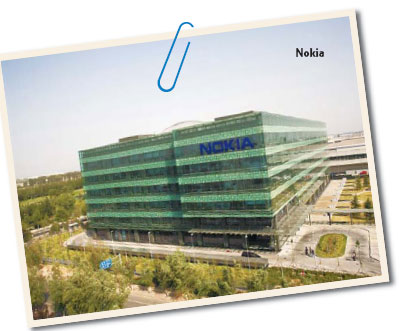
|
CHINA> Green Economy
 |
|
Nokia: co-ordinating green businesses
(China Daily)
Updated: 2009-09-10 15:36 A subsidiary of Nokia, one of the leading companies in the global communications industry, Nokia (China) Investment Co Ltd is now the largest mobile device manufacturer in China, specializing in producing a number of cell phone models and providing after-sales services.
 As one of Nokia's major production bases, products manufactured in China are not only sold on the domestic market, but also exported to more than 100 countries and regions. The success of Nokia China has seen the company now employ more than 6,000 people. The predecessor of Nokia (China) Investment Co Ltd was Beijing Capital Nokia Mobile Telecommunications Co Ltd, founded in 1995. In 2001, the company moved to the Beijing Economic Development Area (BDA). Along with the development of communications technology, Nokia has expanded its business in China, outgrowing its former production environment and underlining its need for new manufacturing facilities. With its excellent geographical location, convenient transportation and sophisticated infrastructure, BDA has proved itself up to the challenge of accommodating Nokia's expansion in Beijing. Due to its high service levels and a series of incentive policies, the BDA has attracted a number of leading players in the mobile communications industry, in addition to Nokia, to form the Xingwang Industrial Park. Here the BDA has established a complete mobile phone industrial chain, including R&D facilities, production, sales, logistics, accessories supply and a regional headquarters. To boost the effectiveness of the park, it is necessary for both the central administration and the individual companies on-site to be run efficiently. To this end, the BDA has established a special customs clearance service for businesses based on the park, offering a 24-hours-a-day operation. The park project was initiated by Nokia and construction began in 2000, with work completed a year later. In 2005, a $300 million investment saw the park expand dramatically and added four further businesses to the site. In 2006, work began on Nokia China's headquarters and R&D facilities. The two projects were completed in 2008. The park currently employs 50,000 people, across Nokia and its 20 partner companies.
Like many senior figures working in close association with the BDA, Ying Pwok, operations director of the Nokia Beijing Mobilephone Plant, has nothing but praise for the organization: "I am from Malaysia and I have been working here for four years now. The BDA has developed a lot during that time. Life here is now far more convenient, the facilities are more complete and the environment is far more beautiful. "I can't help falling in love with the place and everything here. This has become my home now. I know that many of the staff in the Nokia building feel the same." As an important economic area and home to a number of international businesses, the BDA became one of the stops for last year's Olympic torch relay. On the day, some 500 volunteers from Nokia gathered and waited. When the torchbearer came into sight, they loyally greeted him with shouts of: "Come on, Olympics! Come on, Beijing! Come on, BDA!" In terms of green development, Nokia and BDA share many similar beliefs. Throughout its history, the phone company has paid considerable attention to environmental protection, energy saving and emission reduction. In line with this, the Xingwang Industrial Park has been conceived as the most environmentally-friendly mobile phone industrial chain possible. The concentration of the chain, allows travel and transportation to be kept to a minimum, considerably reducing harmful carbon emissions. Additionally, all of the companies in the park have passed the ISO14001 international environment management standard. Even the Nokia headquarters and its R&D center are officially "green" buildings. From its very earliest designs, the headquarters building was always conceived as complying strictly with the Green Building Rating System, a design standard instigated by the US Green Building Council. Compared with typical commercial buildings, the HQ can save up to 37 percent on its water usage and 20 percent on its energy consumption every year. In November 2007, Nokia, together with the management committee of the BDA, sent a green development proposal to all the companies in the BDA. Nokia also co-ordinated all of the partners in the Xingwang Park in the launch of a "Xingwang Park Green Box Plan". Under the terms of this scheme, every business in the Park was obliged to set up collection points for unwanted cell phones and accessories. All of the Park's employees were actively encouraged participate in the project through a series of emails and posters.
 |